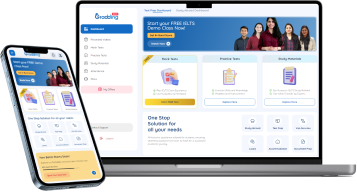How to Crack IELTS in 30 Days: Step-by-Step Preparation Guide
Last updated: Oct 15, 2025Appearing for the IELTS test with just 30 days' study seems to be a challenging task. However, learning how to crack IELTS in 30 days is entirely possible with the right approach and consistent effort. With a well-structured plan and dedication, one can master all four sections of IELTS, like listening, reading, writing, and speaking. This comprehensive write-up will help you effectively manage your schedule, focus on key skills, and build confidence. Whether you are aiming for a high band score for college admission, job opportunities, or immigration, this blog will empower you to achieve your IELTS goals in 30 days and reach your dream results.

Table of Contents
IELTS 1-Month Study Plan: Week-by-Week Breakdown
This IELTS 30 days study schedule provides a detailed week-wise breakdown, helping you stay organized and focused.
Week 1: Building a Strong Foundation
In week 1, you should get familiar with the IELTS test format and scoring system, complemented by a practice test to assess your current preparation level. Listening to English podcasts, news, and TED talks while practising IELTS listening exercises could be one of the most practical ways to master the exam. At the same time, one can boost vocabulary by learning 10 new words every day, using them in sentences, and preparing flashcards to remember them quickly.
Days 1–2 – Understand IELTS Format, Test Modules & Scoring Criteria
The initial two days of IELTS preparation should focus on thoroughly understanding the test format, including four sections: listening, reading, writing, and speaking. Understanding the structure, timing, and question types of each module is crucial for the effective execution of preparation strategies. Other key points to focus on:
1. Understand the difference between academic and general training tests.
2. Know the IELTS scoring criteria for the writing and speaking sections.
3. Recognise the importance of grammar and vocabulary.
4. Develop the practice strategies.
Days 3–4 – Identify Strengths and Weaknesses; Set Target Band Scores
On the 3rd and 4th days, one must focus on evaluating one's current English skills to identify areas of strength and weakness. This self-introspection helps in setting realistic target band scores and prepares a focused study plan.
1. Attempt practice tests to pinpoint strong modules and weak modules.
2. Analyze mistakes to understand the weak areas.
3. Priorities improving weaker skills for balanced outcomes.
4. Use targets to guide daily study goals and watch your progress.
Days 5–7 – Basic Listening and Reading Practice & Review Week 1 Progress
From days 5 to 7, focus on reading practice, foundational listening, and building essential skills. Consistent practice improves your comprehension and speed, which is crucial for the IELTS exam. And at the end of the week, review your progress to identify improvements.
1. Practice basic listening exercises every day.
2. Work on reading passages to improve accuracy and speed.
3. Assess overall progress from week 1.
4. Lastly, adjust the study plan based on performance feedback.

Week 2 – Strengthening Core Skills
With a thorough understanding of the exam demand, the focus now shifts to core skills. To make your preparation more accurate and effective, always begin by targeting the areas where you struggle the most. Meanwhile, do not forget to seek feedback from mentors or peers to improve your skills based on their suggestions.
Days 8–9 – Listening Practice: Focus on Accents and Accuracy
Moving ahead with days 8 and 9, focus on sharpening your listening skills in different accents, including Australian and American. To make the most of this practice, focus on listening accuracy by identifying keywords, tone, and context during practice exercises.
1. Practice with podcasts, news, and videos from English-speaking countries.
2. Improve accuracy by noticing key details and paraphrased information.
3. Review transcripts to understand missed answers better.
Days 10–11 – Reading Practice: Skimming, Scanning & Time Management
Days 10 and 11 focus on improving reading strategies, like skimming for the main idea and scanning for specific details. This helps you read faster and place answers efficiently.
1. Practice skimming to quickly grasp the overall meaning.
2. Use the scanning technique to find keywords and factual details.
3. Review incorrect answers for proper analysis of mistakes.
Days 12–13 – Writing Practice: Task 1 & Task 2 Structure and Cohesion
On the 12th and 13th days, focus on understanding the structure and cohesion. A well-organized response with logical interlinking and flow improves your band score significantly.
1. Learn the ideal format of essays on Task 1 and Task 2.
2. Observe the paragraph structure and local flow.
3. Practice with the sample practice paper.
Day 14 – Speaking Practice: Fluency, Pronunciation, and Vocabulary; Weekly Review
On day 14, dedicate time to improving speaking skills by focusing on pronunciation and expanding vocabulary. Moreover, assess your progress from the week to identify strengths and areas that require further improvement.
1. Work on right pronunciation and natural intonation.
2. Use different vocabulary to express ideas.
3. Record and listen to your responses for self-assessment.
Week 3 – Practice with Mock Tests
Week 3 is all about your chance to train your brain for D-day conditions and turn practice into real progress. Start taking full-length mock tests every other day to simulate the real IELTS experience. Try to stick to strict timing for each section to boost your speed and potential. After every mock test, don't just move on; carefully review your mistakes.
Days 15–16 – Full-Length Listening & Reading Tests
Devote days 15 and 16 to full-length listening and reading tests to experience a real exam setting.
1. Finish the timed IELTS mock test for both sections.
2. Review mistakes and understand errors.
3. Watch your progress for further improvement.
Days 17–18 – Writing & Speaking Mock Tests
The next 17th and 18th days are dedicated to writing full-length writing and speaking mock tests to simulate the exam setting. It helps build confidence, improve time management, and determine areas for improvement.
1. Do targeted practice after identifying your weak areas.
2. Practice speaking under exam conditions
3. Finish timed writing tasks.
Days 19–20 – Analyze Mistakes, Focus on Weak Areas, & Improve Vocabulary/Grammar
Review your practice tests on days 19 and 20 to figure out the common mistakes, and pay attention to vocabulary and grammar to enhance overall performance.
1. Analyze errors in all the sections
2. Improve weak areas with focused practice.
3. Expand vocabulary with new words.
Day 21 – Week 3 Review & Track Overall Progress
On day 21, take out time to review your week 3 performance. Analyze progress in each IELTS module, track improvements, and adjust your study schedule accordingly to stay on the targeted band score.
1. Determine consistent mistakes.
2. Measure progress in each skill.
3. Update study goals for next week.


Week 4 – Final Revision and Exam Readiness
Week 4 is the final push before the exam, so it's all about smart strategy and analysis. Review the weak areas you identified earlier and give them extra attention. Utilize this time to fine–tune your test-taking approach and learn how to manage your time wisely during the exam, and try out simple mind-relaxing techniques to stay calm under the exam pressure. Later, go through your response very carefully and follow different strategies for each section.
Days 22–23 – Revise Weak Areas in Listening, Reading, and Writing
Use days 22 and 23 on your weakest section in the IELTS exam. Here are the ways to utilize these days:
1. Re-attempt incorrect questions from the previous tests.
2. Learn the best application of grammar and vocabulary
3. Strengthen scanning and skimming skills.
Days 24–25 – Final Speaking Practice and Essay Polishing
In the final days of your one month IELTS study plan, refine your speaking skills and polish your essays along with clarity, fluency and coherence to ensure high performance in the exam.
1. Practice the full speaking test aloud.
2. Record and review your responses.
3. Utilize review and feedback.
Days 26–27 – Full-Length Practice Test for All Modules; Time Management Tips
On days 26 and 27, take a full-length IELTS practice test covering all four modules. Focus on replicating real exam conditions and applying effective time management strategies.
1. Complete all sections under timed conditions
2. Track time spent on each module
3. Identify time-related challenges
Days 28–29 – Mental Preparation, Stress Management & Confidence Boost
A few days before the exam, just focus on mental preparation to reduce stress and build confidence. Positive mindset and mind-relaxing techniques play a vital role in performing well on test day.
1. Practice mindfulness and deep breathing
2. Visualize positive outcomes.
3. Maintain a healthy routine and rest well.
Day 30 – Light Revision, Key Reminders & Test Day Readiness
On the last day, focus on revision and reviewing key points to stay calm and confident. This helps you easily score 8+ band in IELTS in 30 days.
1. Keep all the important vocabulary
2. Revisit test structure and format
3. Get a good sleep before the exam.
Best Exam Day Strategies for IELTS
Here are some of the top exam day strategies for the IELTS exam to help you perform your best:
1. Get a healthy night's sleep to stay alert and focused.
2. Eat healthy meals for steady energy and motivation.
3. Arrive early to avoid the end-of-time rush.
4. Read important instructions carefully before each section.
5. Manage your time wisely and avoid spending too much time on any one question.
6. Stay calm and breathe long and deep if you feel nervous.
7. For the speaking section, listen carefully, speak clearly, and take a moment to think before answering.
8. Use skimming and scanning techniques while reading to save time.
9. In the writing section, plan your answers in brief before you start the test.
10. Lastly, have faith in your preparation and face the exam confidently.
11. Take guidance from offline or IELTS online coaching for fast improvement.
Conclusion
Preparing for IELTS in one month requires dedication, focus, and a solid, effective plan. By breaking down your preparation week-wise, sharpening your skills, and engaging in real-time exam practice, you can enhance your potential. However, do not forget to assess your mistakes and refine your strategies side-by-side. Consistency and motivation throughout the preparation are crucial for achieving the desired band score. So, believing in yourself and taking one step at a time is the key to achieving the desired band. In case of any assistance regarding test preparation, you can take an IELTS exam practice test at Gradding.com. These tests are designed to meet the preferences of all students and simulate real exam conditions. Wishing you all the very best for your future!
FAQs
1. Can I Prepare for IELTS in 30 Days?
Yes, you can prepare for IELTS in 30 days with a focused approach. You need to identify your weak areas, practice all four skills regularly, and follow reliable resources. Consistent mock tests and real-time test strategies will boost your confidence.
2. How Can I Get 7.5 IELTS in One Month?
With the right approach and focus on intensive regular practice across all four sections, one can achieve 7.5 or higher in just one month. So, figure out your weak areas, follow effective exam strategies, consistent regular mock tests, and seek feedback to improve.
3. How Many Hours Should I Study Daily for The IELTS Exam?
For effective preparation for the IELTS exam, one must aim to study 2 to 3 hours daily. Regular and focused practice is better than long, tiring sessions. So, balance your time across listening, reading, writing, and speaking skills, and add a practice test to track your progress.
4. Can I Prepare for IELTS in One Month Without Coaching?
Yes, you can prepare for IELTS in one month without coaching. With the authentic study materials, a realistic plan, self-study, and dedication can be very effective. Focus on practising all four skills daily, use online resources, take mock tests, and analyse your mistakes carefully. So, staying disciplined is key!
5. What Band Score Can I Realistically Achieve in 30 Days?
Your realistic band score in one month, however, depends on your current English level proficiency and how much time you can devote daily. If you have already scored 6, then focused and a little extra effort could help you reach or go higher. A beginner can make solid progress with consistent effort.
0 comments

Practice Makes a Man Perfect!Take FREE ielts Mock Tests
Start FREE Mock TestPredict your IELTS Band

98% students got exact IELTS Band
What is your Target IELTS Band?
Get familiar with the Real IELTS Exam for Free!
Start Free Mock TestWe are available in :
BangaloreAhmedabadJaipurHyderabadKeralaPuneChandigarhMumbaiGurgaonChennaiKolkataTrivandrumNoidaKochiCalicutKottayamKollamThrissurIndoreUdaipurdisclaimer:logos and other registered trademarks of universities used on this platform are held by their respective owners. Gradding does not claim ownership or association on them, and their use is purely for informational and illustrative purposes.















